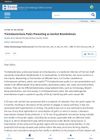 1 citations,
July 2023 in “Scientific Reports”
1 citations,
July 2023 in “Scientific Reports” Wearing a hijab changes the common bacteria and fungi on the scalp, possibly affecting skin health.
 1 citations,
July 2023 in “Foods”
1 citations,
July 2023 in “Foods” Mushrooms offer benefits for food, energy, and water security, and have potential uses in health and environmental applications.
 1 citations,
March 2023 in “Phytochemistry Reviews”
1 citations,
March 2023 in “Phytochemistry Reviews” CBD may improve skin and hair health, but its effective use and safety need more research.
1 citations,
February 2023 in “Pharmaceutics” New UVA-responsive nanocapsules effectively kill microorganisms in hair follicles when activated by light.
 1 citations,
February 2023 in “Drug Design Development and Therapy”
1 citations,
February 2023 in “Drug Design Development and Therapy” Plant adaptogens may help treat skin diseases and improve skin health, but more research is needed to fully understand how they work.
 1 citations,
January 2023 in “Metabolites”
1 citations,
January 2023 in “Metabolites” Changes in gut bacteria can contribute to the development of Polycystic Ovary Syndrome (PCOS), affecting metabolism, immunity, and causing inflammation. Treatments may involve adjusting these factors.
 June 2024 in “Infection and Drug Resistance”
June 2024 in “Infection and Drug Resistance” An adult woman with scalp infection recovered after antifungal treatment, with no return of symptoms.
 May 2024 in “Indian Dermatology Online Journal”
May 2024 in “Indian Dermatology Online Journal” A rare bacterial infection of pubic hair can cause strong genital odor, but trimming hair and using clindamycin can quickly fix it.

Enterococcus faecalis delays wound healing by disrupting cell functions and creating an anti-inflammatory environment.
Polyglutamic acid is a valuable, sustainable ingredient for skincare and haircare products.
April 2024 in “Molecules/Molecules online/Molecules annual” Paris polyphylla saponins may effectively treat acne due to their antibacterial and anti-inflammatory properties.
Aesthetic rehabilitation techniques can improve life quality and wellbeing for disabled patients.
 March 2024 in “Indian Journal of Dermatology/Indian journal of dermatology”
March 2024 in “Indian Journal of Dermatology/Indian journal of dermatology” Exosomes could be key in treating skin conditions and healing wounds.
 March 2024 in “Authorea (Authorea)”
March 2024 in “Authorea (Authorea)” Using lyopreserved umbilical tissue allograft may improve healing and reduce recurrence of pilonidal cysts.
 January 2024 in “Authorea (Authorea)”
January 2024 in “Authorea (Authorea)” Nanomaterials can significantly improve wound healing and future treatments may include smart, real-time monitoring.
January 2024 in “Metabolites” Standardized procedures are crucial for collecting and preparing biological samples to ensure accurate clinical metabolomics results.
 January 2024 in “Biotechnology advances”
January 2024 in “Biotechnology advances” Bioassays help find useful compounds in nature for making medicines, supplements, and cosmetics.
 October 2023 in “Naunyn-Schmiedeberg's Archives of Pharmacology”
October 2023 in “Naunyn-Schmiedeberg's Archives of Pharmacology” Custom software found that common allergy drugs might have new uses for various conditions and could improve survival in some cancers.
 October 2023 in “Biomaterials”
October 2023 in “Biomaterials” Nanotechnology could improve hair regrowth but faces challenges like complexity and safety concerns.
 August 2023 in “International Journal of Molecular Sciences”
August 2023 in “International Journal of Molecular Sciences” The new hydrogel with zinc and polysaccharides improves wound healing and has antibacterial properties.
 August 2023 in “Clinical, Cosmetic and Investigational Dermatology”
August 2023 in “Clinical, Cosmetic and Investigational Dermatology” Research on the human skin microbiome has grown, focusing on skin health and diseases, with more studies needed on antibiotic resistance and AI applications.

Plant-based compounds can improve wound dressings and skin medication delivery.
 July 2023 in “International Journal of Cosmetic Science”
July 2023 in “International Journal of Cosmetic Science” Biopolymers are increasingly used in cosmetics for their non-toxicity and skin benefits, with future biotech advancements likely to expand their applications.

Thermal spring waters and their microbes could be good for skin health and treating some skin conditions in skincare products.
 May 2023 in “Endocrine, metabolic & immune disorders”
May 2023 in “Endocrine, metabolic & immune disorders” Hibiscus rosa-sinensis is used in traditional medicine and is safe in high doses, with various health benefits.
 May 2023 in “Materials research foundations”
May 2023 in “Materials research foundations” Nanomaterials like silver and gold can improve wound healing but need more research for safety.
 May 2023 in “Experimental Dermatology”
May 2023 in “Experimental Dermatology” RCM and OCT are effective for diagnosing and monitoring hair-related skin diseases but lack standardized protocols and need more research.
 January 2023 in “International Journal of Molecular Sciences”
January 2023 in “International Journal of Molecular Sciences” Maxillariinae orchids contain 62 compounds with potential health benefits, including treating skin conditions and diseases like cancer and diabetes.
 June 2022 in “Scientific Reports”
June 2022 in “Scientific Reports” Prevelex, a polyampholyte, can create a cell-repellent coating on microdevices, which can be useful in biomedical applications like hair follicle regeneration.
 December 2021 in “Revista da Sociedade Portuguesa de Dermatologia e Venereologia”
December 2021 in “Revista da Sociedade Portuguesa de Dermatologia e Venereologia” Imbalance in scalp bacteria can affect hair and scalp health, potentially leading to conditions like hair loss, psoriasis, and dandruff.

























